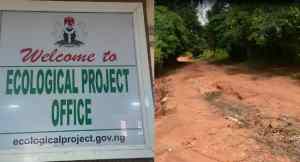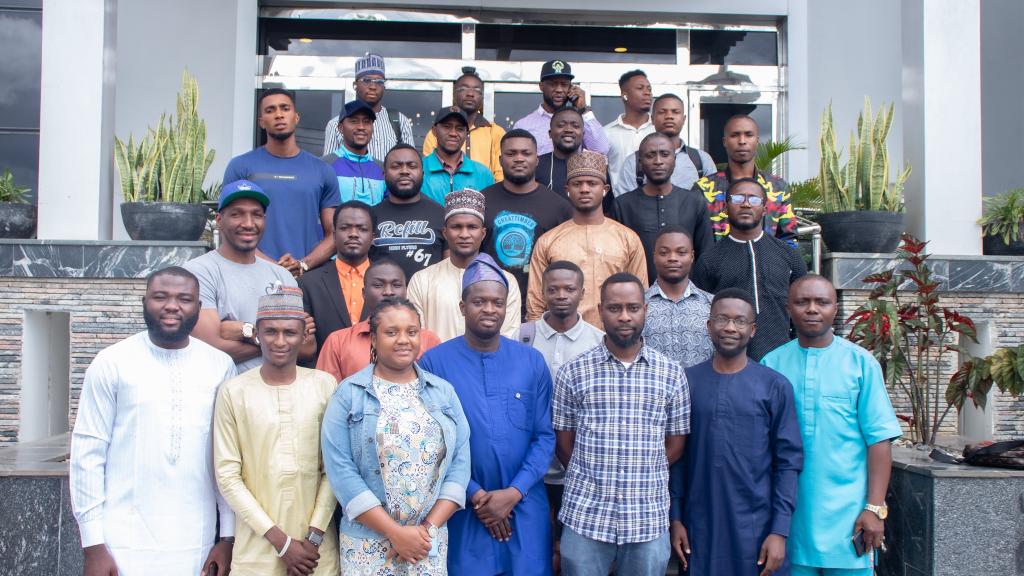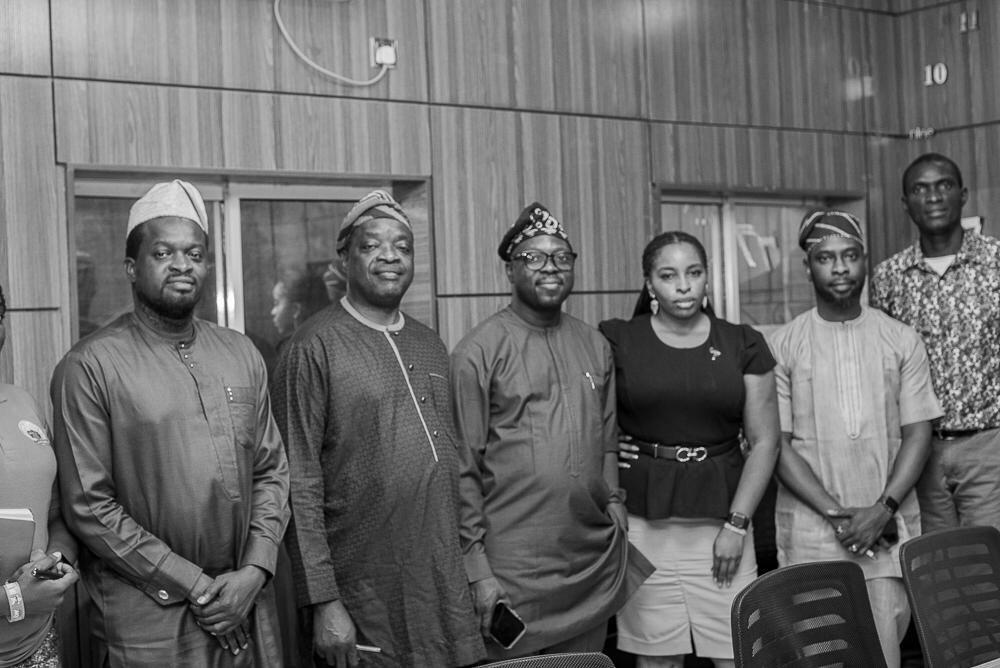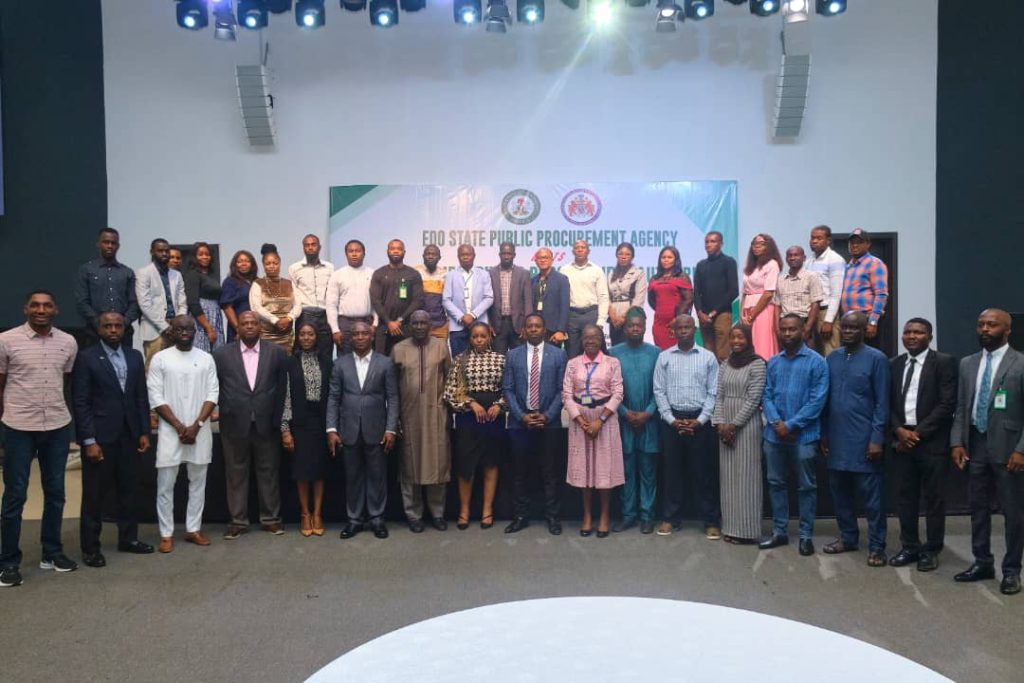This investigation by PATRICK EGWU is the second part of a year-long investigative series on climate change disinformation and corruption produced as part of the Bertha Challenge Fellowship. It looks into corruption, lack of transparency and accountability in the management of ecological funds by the Ecological Project Office.
Read the first part here.
After a road contract was awarded to a cluster of five communities in Udi local government area of Enugu state in 2019, two former top government officials were linked with using their political influence to illegally divert the project away from the beneficiary communities to another community that was not listed on the contract letter.
Habiba Lawal, was the former permanent secretary of the Ecological Project Office and Geoffrey Onyeama, was the former Minister of Foreign Affairs – two critical government positions.
Geoffrey Onyeama (left) and Habiba Lawal were linked to diverting ecological fund contract. Source – Ecological Project Office and Geofferey Onyeama X’s account.
A letter obtained by Ripples Nigeria showed Lawal used her office to authorize the diversion of the contract. Onyeama is from one of the five communities where the contract was diverted to.
“Our community was shortchanged,” said Metta Uwaechie, a resident of one of the beneficiary communities. The diverted contract was intended to tackle erosion problems which currently affects Uwaechie’s community. “We have committed a lot of resources to this because we wanted to solve the problem affecting my community.”
Publicly available contract documents and data accessed by Ripples Nigeria, show that the contract was awarded for erosion control and 3.8 kilometres road improvements to the communities. The contract was approved by the tenders’ board of the office and awarded to Flab Engineering Services Limited for N429,878,805 ($257,000) with Eco Project Services Ltd as consultant. Before the diversion was authorized by Lawal, the contractor had constructed a stretch of 1.8 kilometres of the road project. The remaining 2 kilometres part of the contract is yet to be completed.
The ecological office was created to respond to and mitigate ecological disasters such as flooding and erosion across the country through flood control projects and road improvements for affected communities.
The Ecological Project Office. Photo by Patrick Egwu
With a population of more than 30,000, these communities – Enugu Eke, Ogui Eke, Eke Market Obodo and Amankwo-Oma Eke – live in erosion red zones. Annual rainfalls have caused flash floods and erosion which have washed away farms and homes.
Residents in the affected communities, who are predominantly farmers, say erosion washes away their farmlands during the planting seasons and has affected their food production levels.
Uwaechie told Ripples Nigeria before the application for the project was approved, the communities carried out a bill of quantities — project descriptions, designs and estimated costs which cost N10 million ($5,900).
Diversion of contracts is illegal and a punishable offense in Nigeria, according to the Public Procurement Act 2007. The procurement law deals with fraud and corruption in public procurement or the award of contracts, outlining penalties for any person liable of “conducting or attempting to conduct procurement fraud by means of fraudulent and corrupt acts, unlawful influence, undue interest, favour, agreement, bribery or corruption.”
The penalties include a prison term of five years and dismissal from government services. Neither Lawal nor Geoffrey have been indicted or convicted.
Infographics showing ecological contract awarded to communities and how it was diverted.
In addition, the Ecological Project Office violated its own rules. Per the contract letter, the office says that this “offer of award is in accordance with the conditions of contract and standard bidding documents and the contract is fixed, firm and not transferable.”
Uwaechie said gully erosion is a major issue affecting the community because it affects our mobility and “our farmers count their losses each farming season.”
Ripples Nigeria made unsuccessful attempts to speak with Lawal or the ecological office, including three visits on separate occasions to the office. A Freedom of Information (FOI) request was made to the office on Nov. 18. The office acknowledged receipt but did not provide any details.
See FOI request documents here: FOI request
The request sought to know reasons for the diversion of the awarded contract from the beneficiary communities despite the approved contract letter stating that the project is non-transferable. The second request was to know if the office has any plans to return to the site and complete the diverted projects.
Misuse of ecological funds
The operations of the ecological office have been marred by corruption, lack of transparency and accountability in the execution of public projects across the country, aimed at tackling natural disasters such as flooding and erosion.
The ecological office is run by the Office of the Secretary to the Government of the Federation (OSGF), an office domiciled in the presidency. This leaves little room for transparency or accountability in the use of funds allocated for ecological projects across the country.
Every month, each of the 36 states in the country receives funding allocation from the federal government through the Federal Account Allocation Committee (FAAC). The FAAC disburses revenues generated by the federal government to sub-national levels, including states and local governments. From the allocation, some parts are designed for ecological responses and each state is expected to use same to tackle ecological disasters such as flooding and erosion in their geographical regions.
However, funds allocated to states have been underutilised and sometimes misappropriated, with proven lack of transparency and accountability.
For instance, from June 2023 and June 2024, the state received over N1.36 billion ($812,000) to tackle ecological issues in the area. Between January to June 2024, the states received over N660 million ($394,000), per available data from the National Bureau of Statistics. Of this amount, only N99 million ($59,000), about 15 percent, was allocated to tackle environmental issues such as erosion and flooding in the state.
Infographics showing how much was received as ecological fund and how much was used.
Ripples Nigeria reached out to officials in charge of managing ecological issues in the state to know how the allocated FAAC funds for ecological intervention projects were used but no response was received.
The details of how states use the FAAC funds for ecological projects are often shrouded in secrecy. The funds are usually unaccounted for by state governments and have been subjects of scrutiny by activists and civil society groups.
When a probe panel was set up by the Public Complaints Commission to look into the utilisation of the ecological funds, 27 states, across the country were invited. None showed up, including Enugu State officials.
Protests and lawsuits
Uwaechie said they have written letters to the presidency office about the diversion and need for intervention but there have been no meaningful outcomes. Residents of the community have held protests against the diversion of the road projects to draw government and public attention.
See petition documents here: Petitions against the Ecological Project Office for the diversion of contract. Source – Metta Uwaechie
“The roads leading to our community are bad and affect people who use it daily for commuting, especially farmers who are unable to transport goods to local markets for sale,” said OzoDonatus Oforkansi, a community leader.
For more than five years, Oma-Eke community leaders Ozo Donatus Oforkansi (left), Alexis Ukeje (middle) and Atanasius Enekwe have been advocating for the completion of the diverted project. Photo by Patrick Egwu
With no action from the ecological office, leaders of the communities met and agreed to take legal action. They hired Godwin Onwusi, a lawyer from the community, to file a lawsuit against the Ecological Project Office for failing to complete the project. The suit was filed at the Federal High Court Enugu which has the jurisdiction to hear the case.
Per the court filings of March 2021 about the contract diversion reviewed by Ripples Nigeria, the community is asking the court to compel the ecological office to return to site and complete the abandoned projects and also seeking damages for the diverted 1.8 kilometres of road, and N50 million ($29,000) compensation for negligence and breach of duty by the non-execution of the contract.
“Homes have been destroyed due to the contractor’s failure to complete the project, Onwusi said, adding that communities have “suffered injury by the non-performance of the contract.”
The erosion that the contract is meant to fix is still persistent, he adds.
“A public officer is personally responsible for any criminal act committed in the performance of his or her official duty,” he said. “It was a criminal offense for her (Lawal) to divert the contract.”
The community is seeking to join Lawal in the lawsuit.
Despite the diversion, Onwusi told Ripples Nigeria that the community is willing to pursue all available legal options for as long as it takes.
The case was scheduled to come up on Oct. 31 but was adjourned to Jan. 22, 2025.
Uwaechie said he is still angry that the project was hijacked by “some powerful interests.”
“It was heartbreaking but I hope they come back and do the right thing for my people,” he said.
The post INVESTIGATION: The Ecological Project Office awarded a project…then diverted it appeared first on Latest Nigeria News | Top Stories from Ripples Nigeria.
Last modified: November 28, 2024









